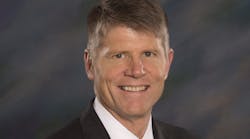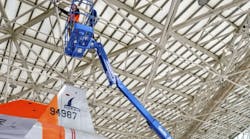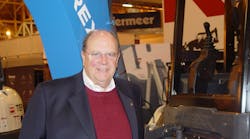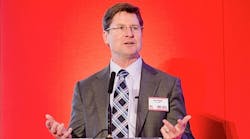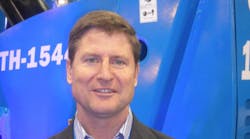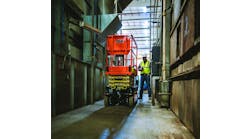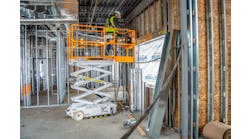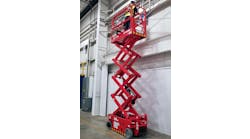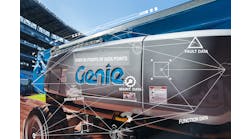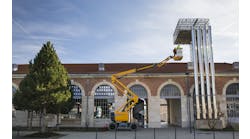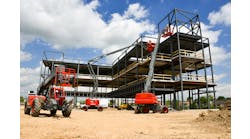At the recent Rental Show in Atlanta, RER sat down with new Terex CEO John Garrison and Matt Fearon, president of Terex Aerial Work Platforms, aka Genie, to talk about Garrison’s history with the rental industry, the latest trends with Genie and Terex and how Genie made it to 50 years. And more!
By Michael Roth, RER
RER: John, you are new to Genie and Terex, how do you like it so far?
Garrison: I actually spent time with Genie when I was with my old job. I was out in Moses Lake with the Genie group, looking at their plants, their engineering and their product development. So I actually spent time with Genie before I started with Terex. It’s an exciting company, a leader in their industry and the 50-year anniversary is really special. There aren’t that many companies in the world that can claim that. So there are a lot of good things going on.
RER: I heard on your conference call that Terex is conducting a review of its Construction business. Can you explain a little about that?
Garrison: It’s a strategic review. We’re trying to assess if certain lines throughout the business will earn their cost of capital throughout the business cycle and if they do we’ll keep them and grow them and if they won’t we’ll make that determination as well. I don’t want to pre-judge but we’re definitely looking at some elements. There are other businesses within Construction that are doing quite well, that have a dependable competitive advantage, so we’ll look at the individual business lines within Construction and make the determination based on those products and product offerings.
RER: Are the AWP, Ports and Cranes businesses perhaps on more solid ground?
Garrison: The way I look at those businesses, they have global reach and global scale. That’s important because in a global marketplace, you’ve got to have the ability to compete globally. You look at a company like Genie; it’s in about 80 countries now, with manufacturing in multiple places around the world, so it gives you the scale to compete in a hyper-competitive global marketplace. Those other businesses have that scale of reach, while Construction is a lot smaller so it makes it a bit more difficult.
RER: Is this your first exposure to the rental industry?
Garrison: No. It’s been about nine years since I came to the Rental Show, so it’s been a while, but it’s not my first Rental Show. I was here in my Textron days, with Cushman and some of the other products. And way back when I was with Case. But it’s been a few years. It was fun to come back and walk around and see some of the companies and how some have grown. It’s interesting when you haven’t been around in a few years to come back and see how the industry has evolved and changed.
RER: What’s new with Genie?
Fearon: Things are healthy! We’re excited about the 50th! It’s a big deal for us, and like John said, it’s a history worth celebrating. If you look back at the roots of the company, we held on to a lot of things around innovation, around focusing on customers and having an outstanding team. So as I look at it today, it’s 50 years and we have a great past, so let’s take the good pieces of it and start looking at the future. And when you look out at the show and the products that we have, there are definitely new pieces of innovation, such as the 60-foot electric boomlift.
Garrison: I’m a strong strong believer in that the core of a business strategy is your product and service strategy and innovation, pushing innovation through your products and your services to be competitive in the marketplace. Through the business cycle, and I’ve been in cyclical businesses most of my career but one of the things I have learned is that you need to invest in the cycle. So we’ll be cost-effective in areas where we need to be cost-effective, but we will not look to our engineering and product development efforts as an area to save money and drive margins. We’ll challenge the team to bring to the marketplace innovative products that have higher margins than the products they replace. That’s the challenge the team has to take and the great news about Genie is that it has done that.
The other thing that Genie stood for that I think is very important, and also speaks to the growth potential, is that they have helped to create the industry of safely working at height in difficult environments. So that’s been the core ethos of the company. And if you think about it, Europe is that way and North America is that way but there’s a whole world out there that doesn’t necessarily operate to the same standards that we do in North America and in the EU. So if you think about that and the number of people that are in those developing worlds, there are significant growth opportunities for this type of product around the world. There are opportunities for continued growth in North America and Europe for sure, but also global growth. And it will take time and it has taken time, but you’re starting to see countries adopt similar style practices and that creates a tremendous growth opportunity for us.
Fearon: Brazil took off in the last cycle beyond what I think any of us expected and it’s come down faster. It will come back though because it was driven by standards. We’re seeing nice year-over-year growth in China but still it’s relatively small to the overall piece. When I was there last year I was sitting down with the sales guys and I said “Let’s go over your customer list” and they had big smiles on their faces and I said “What are you smiling about?” They said these are all new, these are all different from what we showed you three years ago and these are all rental companies. So rental is developing there. It’s starting to accelerate, they are getting more organized, and they are definitely studying the more mature markets, so I think the potential is there. It’s just a matter of when.
RER: Of the new products you are developing this year are there some you are particularly excited about?
Fearon: The two 60s that are out there, the Z62 and the Z60 with that electric drive are very important pieces of our portfolio. They are both outstanding products that have Genie roots. We invested in the Z-Boom and we want to fill that product line out with new innovative products. We also have the 844 [telehandler] with the 74-horsepower engine in it, so again we’re looking at this rental ROIC as our theme for our engineering and we’re looking at where do the rental companies get the good returns. I think those are great examples where we see some ways to get some innovative products to the market. We also have a triple-entry platform on that 60-footer that allows operators to get in and out easier and that will become standard on our boom product line.
We’ve got a new light tower out there. It’s all about getting them on trucks; we can get 17 on trucks instead of 10. They have long run times; fuel tanks are 50-percent bigger.
RER: Is there growing interest in hybrid machines in the rental market?
Fearon: Absolutely. We see that growing, Europe is the most interested in that, but also in other parts of the world there is a very high level of interest in that technology. It’s driven by Tier 4 engines that have come out with a more complicated power pack, so here’s another solution. So I think we’ll see that more widely accepted.
RER: What are you hearing from rental customers now, do they seem pretty positive and upbeat?
Fearon: I’d say cautious. The North American market in particular, everybody is kind of sitting back, making sure their utilization goes up. They are watching their rates closely, which is healthy for the industry that everybody is watching their metrics, getting time utilization up, and they’re going to keep trying to get their rental rates up. So in the meantime they are cautious about their capex that they are putting forward. It’s still good but they are sitting back. They also recognize that there is capacity in the industry so they can call us up and get what they need. It’s not something that we haven’t seen before that we’re uncomfortable with, that’s how the business is. So they’re a bit cautious but there’s a lot of construction going on out there.
RER: Are there any particular conditions in the market that you see that would influence the kind of products that you’d produce, for example multi-family dwellings as opposed to single-family homes, or other trends?
Garrison: I’d say part of Genie’s success is we do have an active program of listening to the customer, that’s where a lot of real good product ideas come from, solving a customers’ problem. And a lot of times the customer won’t know exactly the engineering way to solve the problem, but that’s not their job, that’s our job. We listen to what kind of problem, what are the innovations, where are things going, and then we come back and take that feedback and design and develop new products. And in the development process, [Genie is] very good at bringing customers in and saying “Is this what you meant? Does this meet your needs?” That constant reinforcement gets you to the point that when you bring a product to market, it’s successful and the reason they know it’s going to be successful is because they listened to the customers and that’s what the customers asked us to bring. It’s a self-reinforcing process that they have, that great companies do have, about driving innovation.
One thing is we won’t try to time the market with our investments. You get in trouble doing that. We want a consistent level of innovation, product development, irrespective of where we are in the cycle, because it’s hard to time the cycle. That capability is not a light switch, so if you’re not continuing to exercise the product development muscle as I say, it atrophies and it’s hard to start it back up. And I think Genie has done a great job through the ebbs and flows of the cycle of keeping the focus on customers and keeping focus on innovation that means something to customers.
That’s the other part of innovation. Sometimes you innovate and it doesn’t mean anything to a customer. It doesn’t drive an improvement for the customer; it doesn’t help their return on invested capital. It sounds really cool to an engineer, but the customer says “I don’t care about that.” That’s the whole thing about listening. I think Genie has done a really good job of listening to the customer and anticipating based on listening to where the market is going. They’ve done it for 50 years and we’re confident they’re going to do it for 50-plus more.
Fearon: One example of a product that we did connect to housing is the 6K telehandler; this will be our first full year of production. We knew smaller ones would connect in the housing market. That would be an example of something that we were definitely targeting to something. But as John said, you can’t time it. The 12k and 15k telehandlers are good for the oil-and-gas market and just as we came out with them, that market went down. We’re really at full line across the board with telehandlers, booms and scissors, so it’s more about making sure we are optimizing the products we have so our customers can make good money off them.
Garrison: It’s a challenging time in the market place, but Genie is doing well. The market is cautious but we’re not looking at the great recession time. There is pressure no doubt, but the independent operators are pretty bullish people. They are entrepreneurial and they try to find a way.
